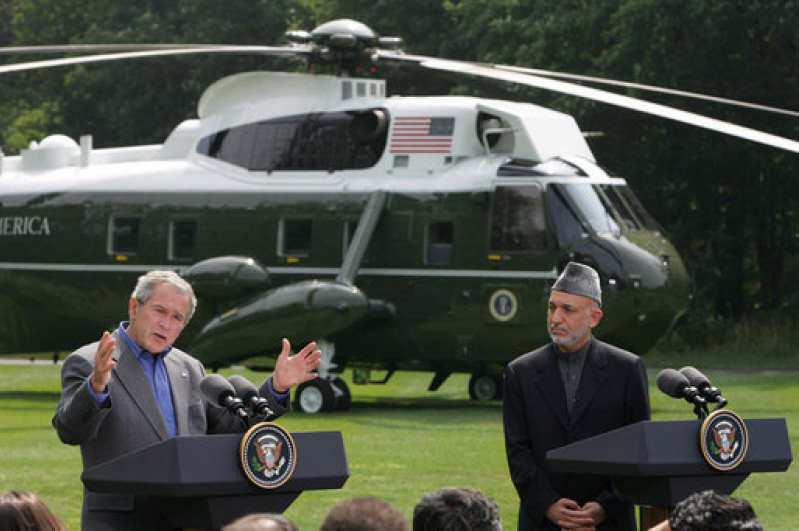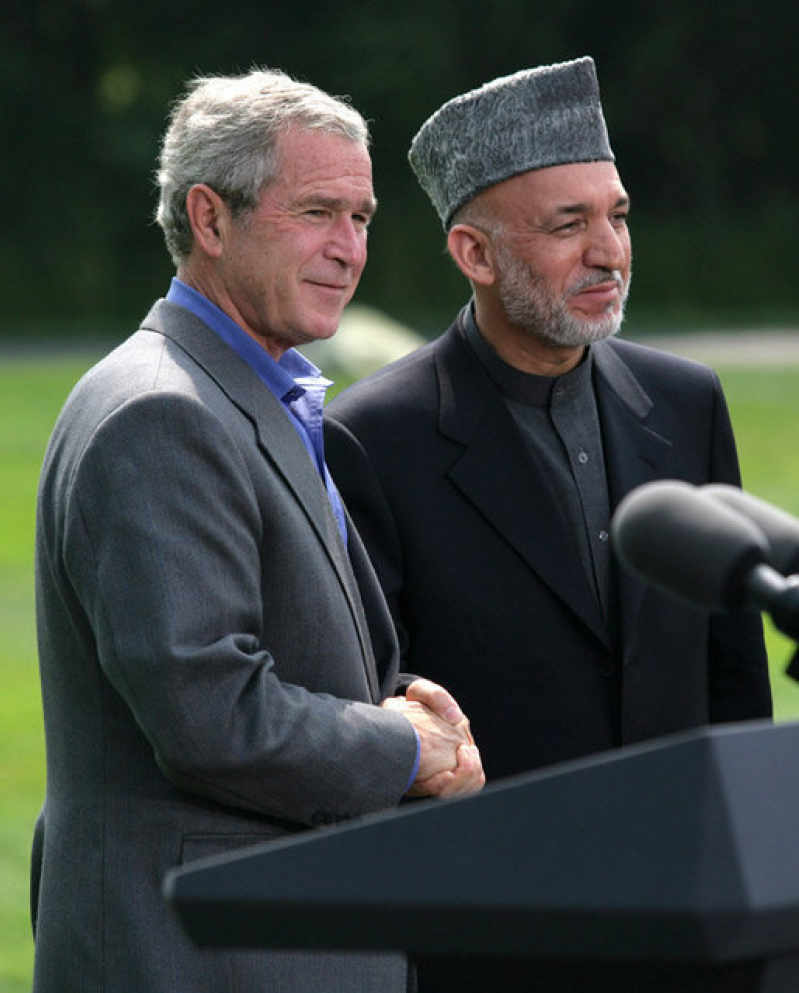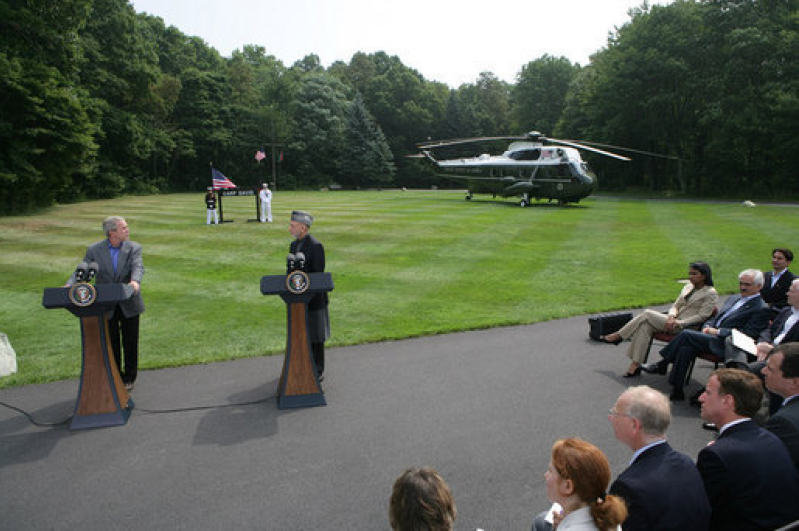


The families of the South Korean hostages held by Taliban insurgents in Afghanistan are disappointed in the outcome of the Bush-Karzai summit, which they say made insufficient efforts to secure the release of the Christian volunteers.
“We could not sleep at night due to our expectations, as the release and safe return of our families depended on the two leaders’ summit,” said the hostage families’ statement released Tuesday, according to Agence France-Presse.
“But the summit, which failed to concretely touch on the families detained in Afghanistan, made insufficient effort to actively save precious lives,” they said.
U.S. President George W. Bush and Afghanistan president Hamid Karzai met outside of Washington at Camp David for a two-day summit that concluded Monday. The leaders discussed Afghanistan’s deteriorating security problems and other issues including the 21 remaining Korean hostages held by Taliban rebels.
Following the summit, both leaders confirmed that exchanging Taliban prisoners for the hostages is not an option.
“Both leaders agreed that in negotiations for the release, there should be no quid pro quo for the hostages. The Taliban are brutal and should not be emboldened by this,” White House spokesman Gordon Johndroe said, according to Reuters.
However, “President Bush expressed strong sympathy towards the relatives of the Koreans, especially those of the Koreans whose lives have already been lost," Johndroe said by telephone after the Bush-Karzai summit, according to AFP.
From the start of the crisis, Washington has held the position that it does not make concessions to terrorists. Afghan president Karzai has likewise repeatedly refused an exchange for rebels.
"We shouldn't encourage kidnapping by actually accepting their demands ... In this situation we are doing what is the best for the interests of the hostages, and government," said Humayun Hamidzada, spokesman for Afghan president Hamid Karzai, according to Reuters.
"If we keep on responding positively to the demands of terrorists, we will face more problems," he added.
Karzai had received criticism from the United States and European nations after he exchanged five Taliban fighters for an Italian reporter in March. Although the Afghan president has vowed that the trade was a one-time deal critics say the prisoner exchange incident was enough to encourage recent abductions in the country..
Regardless of how the current hostage situation turns out, however, the Taliban said they plan to continue their kidnapping policy to pressure the Afghan government.
“Whether the Kabul administration will do the (prisoner) exchange or not, it will not have any effect on our side,” said Ahmadi, according to The Associated Press. “The process of kidnapping (foreigners) will be ongoing.”
In response to Washington-Kabul’s hardline stance against the exchange, the Taliban said that it is still deliberating on how to proceed in the hostage situation.
Reportedly, the militants have proposed another, more feasible demand – the exchange of the female Korean hostages for imprisoned female Taliban supporters, according to Yonhap news agency in Seoul. The Afghan females are not linked directly to violence but are jailed for providing food and shelter to Taliban rebels.
“We do not know the exact number of Taliban women imprisoned by the Afghan government, but if (Kabul) lets them go, we will release the same number of females hostages,” said purported Taliban spokesman Yousuf Ahmadi, in a telephone interview with Yonhap.
Yet other news agencies have conflicted with Yonhap’s report and indicated that Ahmadi continues to demand the release of militants for the Korean hostages or there will be a “bad result,” according to The Associated Press Tuesday.
“Bush and Karzai have to accept the Taliban conditions otherwise they will see a very bad result for Korean hostages," Ahmadi said, according to AP.
South Korea, although not publicly calling for the release of the Taliban rebels, has urged “flexibility” and sent a delegation to Washington last week to plead for more U.S. intervention in the hostage crisis.
Seoul said it has conveyed to the Taliban that it is virtually powerless in granting the rebels’ demand to free prisoners held by the Afghan government and U.S. forces.
Meanwhile, family members of the Korean hostages are becoming increasingly more desperate as time passes. The hostages are in their 20th day in captivity and are said to all be ill with two females gravely sick and facing possible death from their illness.
An Afghan doctor said he dropped off medications for the hostages on Sunday and was told by the Taliban captors that they had picked the medications up.
The families have made home videos appealing for the release of the hostages and posted them on websites including YouTube. The husband of hostage Kim Yoon-young, 35, gave a tearful plea for the release of his wife and said he hated himself for eating and sleeping while she suffered in Afghanistan.
“You must be very sick and in hard conditions and I disgust and hate myself for eating and sleeping,” said Rhyu Haeng-shik, 36, according to AFP.
"I earnestly hope you can get over this difficult time with healthy and positive thoughts (of meeting again) while keeping your dear children in mind," Rhyu said in the two-and-a-half minute video entitled "To my dearest wife in Afghanistan."
In addition to physical difficulties, the hostages are reportedly also being pressured to covert to Islam, according to Reuters. The group of Korean Christian volunteers has reportedly said they will consider the offer.
“Again and again have invited them to become Muslims and they said they will deliberate on it,” said a Taliban commander, who asked to remain anonymous, according to Reuters.
It has been nearly three weeks since the group of South Korean Christians, originally numbering 23, were kidnapped by Taliban militants in Afghanistan’s insurgency-plagued Ghazni province. The church group was on its way to provide free medical services to poor Afghan citizens when their bus was hijacked on July 19.
The leader of the aid group, Bae Hyung-kyu, was the first victim, found dead July 25 with 10 bullet holes in his body. The second victim, 29-year-old Shim Sung-min, was killed last Monday and his funeral ceremony was this past Saturday.
The kidnapping of the 23 Korean Christians was the largest abduction of foreigners in Afghanistan since the fall of the Taliban regime in 2001.






